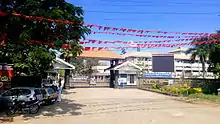Kerala Minerals and Metals
Kerala Minerals and Metals Ltd is an integrated titanium dioxide manufacturing public sector undertaking in Kollam, Kerala, India. Its operations comprise mining, mineral separation, synthetic rutile and pigment-production plants. Apart from producing rutile-grade titanium dioxide pigment for various types of industries, it also produces other products like ilmenite, rutile, zircon, sillimanite, synthetic rutile etc.[2] It is one of the best performing Public Sector Units in India.[3]
 Entrance of KMML, Kollam | |
| Type | Public Sector |
|---|---|
| Industry | Mining |
| Founded | 1932 Kollam, India |
| Founder | F. X. Perira |
| Headquarters | Kollam(Quilon) , |
Key people |
|
| Products | |
| Revenue | |
Number of employees | ~2000 |
| Website | kmml |
The company manufactures titanium dioxide through the chloride route. The different grades are produced by KMML under the brand name KEMOX.
KMML has always been responsive to social and environmental causes. Some of the initiatives taken by KMML have made a significant change to the area and its people.
History
The history of the beaches of Sankaramangalam and nearby areas is linked with the history of the KMML. The rare-earth minerals made the beach an area of scientific interest. The discovery process for this huge Indian deposit was accidentally initiated in the year 1909 when C. W. Schomberg, a German chemist, identified the presence of monazite in the sand remnants of contaminants of coir imported from Kerala.[4] Encouraged by the great demand in those days for thorium oxide in gas mantle, Schomberg established the first plant at Manavalakurichi (MK) in 1910 for separation of monazite and later another plant at Chavara. Subsequent to the arrest of Schomberg on charges of being a German spy during the First World War, both his plants at Manavalakurichi and Chavara were closed down.
The London Cosmopolitan Mineral Company established in the year 1914 in London took over these plants and continued operations. In 1920, Hopkins and Williams (H & W), yet another London based English Company started operation at MK and Chavara. The first export of ilmenite from Chavara took place in the year 1922 and the Indian ilmenite maintained a virtual monopoly in the world market as basic raw material for titania pigment (white) till 1940 when four plants belonging to Travancore Minerals Ltd (TMC), Hopkins & William Travancore Ltd (H&W) and Fx Pereira & Sons (FXP) together exported as high as three hundred thousand tons of ilmenite from Chavara.
By 1932, a private entrepreneur established the F. X. Perira and Sons (Travancore) Pvt. Ltd, the forerunner to KMML. Ownership of the company subsequently changed hands three times, after which in 1956 it was taken over by the state government and placed under the control of the industries department.[5] The unit was subsequently converted as a limited company in 1972 by the name of 'The Kerala Minerals and Metals Ltd.' with the objectives of better utilisation of mineral wealth found along the sea coast of Kollam and Alappuzha Districts, generation of growth and employment in the state in general and the local area in particular.
The construction of titanium dioxide pigment using chloride technology began in 1979, and was commissioned in 1984 as the first and only integrated titanium dioxide plant in the world.
Today the company has over 1600 employees and a range of products.
Supply of Titanium Sponge to Defence Ministry units of India and Dept of Space
KMML in Kollam is the sole producer-cum-supplier of Titanium sponge in India.[6] This prestigious and pride institution has recorded 94.5% rise in Quarterly profit recently.[7] Defence Ministry unit in India requires more than 1,500 tonnes of TS annually. The Department of Space in collaboration with KMML has set up a 500 tonne per annum (TPA) titanium sponge plant in Kollam KMML premises to meet their annual requirement of 2,000 tonnes. They have fully commissioned their Titanium sponge plant recently at Kollam KMML.[8][9]
Revenue [10]
| Financial Year | Turnover | Net Profit |
|---|---|---|
| 2015-16 | ₹653.91 crore (US$92 million) | ₹3.24 crore (US$450,000) |
| 2016–17 | ₹727.04 crore (US$100 million) | ₹40.37 crore (US$5.7 million) |
| 2017–18 | ₹740.58 crore (US$100 million) | ₹181.11 crore (US$25 million) |
| 2018-19 | ₹829.89 crore (US$120 million) | ₹163.29 crore (US$23 million) |
References
- "Management – KMML". KMML. Retrieved 17 November 2016.
- "Sail signs MoU with KSIDC & KMML for titanium project". Archived from the original on 14 August 2014. Retrieved 14 August 2014.
- "Government honours Best Performing PSUs & CEOs for 2011–12". Retrieved 14 August 2014.
- NPCS Board of Consultants & Engineers (2009). Handbook on Rare Earth Metals and Alloys (Properties, Extraction, Preparation and Applications). ASIA PACIFIC BUSINESS PRESS Inc. p. 10. ISBN 9788178331201.
- "KMML functions with old machines, lacks safety". Deccan Chronicles. Retrieved 20 August 2014.
- "Titanium Sponge Plant – KMML". KMML – Kollam city. Retrieved 24 August 2015.
- "KMML posts 94.5% rise in Q1 profit". Business Line. Retrieved 24 August 2015.
- "ISRO's titanium sponge plant in Kerala fully commissioned". ZEE News. Retrieved 24 August 2015.
- "Kerala Minerals and Metals Limited net profit at all-time high". Business Standard. Retrieved 20 August 2014.
- "KMML declares dividend of ₹2.47 crore". Business Line. Retrieved 25 June 2019.